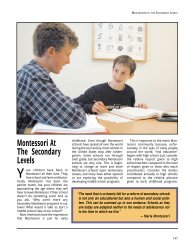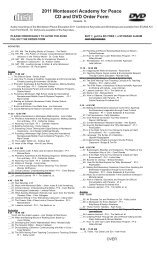Tim Seldin & Paul Epstein Ph.D. An Education for Life
Tim Seldin & Paul Epstein Ph.D. An Education for Life
Tim Seldin & Paul Epstein Ph.D. An Education for Life
You also want an ePaper? Increase the reach of your titles
YUMPU automatically turns print PDFs into web optimized ePapers that Google loves.
CLOSING THOUGHTS<br />
214<br />
Left:<br />
The first issue<br />
of Tomorrow’s<br />
Child<br />
Magazine<br />
published<br />
in 1993.<br />
that Montessori parents are less likely<br />
to push their children (either consciously<br />
or unconsciously) into pursuing<br />
high-status careers, just because<br />
the social status of certain professions<br />
is the standard by which the world has<br />
come to measures success.<br />
I hope that parents who choose<br />
Montessori are most concerned that<br />
their children will grow up to be<br />
The dichotomy inherent in<br />
your question is false. Montessori<br />
is the real world. The<br />
Montessori classroom is very much<br />
true to life. The child is pursuing an<br />
interest in the context of many choices.<br />
Isn’t that what society is all about?<br />
Montessori children see their own<br />
growth, constantly respond to their<br />
own needs in relation to the multiaged<br />
community around them. They<br />
learn to make individual choices that<br />
connect with their capabilities. <strong>An</strong>d<br />
that may be different than making it<br />
on Wall Street or becoming a doctor,<br />
lawyer, or preacher.<br />
The Montessori classroom allows<br />
<strong>for</strong> a diversity of individual expressions,<br />
personalities, and cultural origins.<br />
We must broaden the images of<br />
success: carpenter, welder, automotive<br />
mechanic, beautician, poet —<br />
responsible, contributing members of<br />
society, adults who will find satisfaction<br />
and fulfillment in their work, regardless<br />
of their career path. I am hopeful<br />
that my own adult children will<br />
approach each day of their adult life<br />
with the same enthusiasm and eagerness<br />
to grow that they experienced as<br />
young children in their Montessori<br />
classrooms.<br />
At the same time, our children must<br />
be cable of accepting the challenges<br />
that life will provide and have the ability<br />
to adapt to new ideas and technology.<br />
If these are outcomes that other<br />
parents share <strong>for</strong> their children, then I<br />
believe that parents can feel confident<br />
in their decision to keep their children<br />
in Montessori programs.<br />
As Editor of Tomorrow’s Child magazine,<br />
I helped select the cover <strong>for</strong> our<br />
first issue back in 1993 (shown at left).<br />
This somewhat controversial cover<br />
the possibilities correspond to the<br />
uniqueness of each child.<br />
Some say that Montessori classrooms<br />
are devoid of competition and,<br />
there<strong>for</strong>e, not part of the “real world,”<br />
but competition, like cooperation, is<br />
natural to life and, there<strong>for</strong>e, emerges<br />
naturally in the Montessori classroom.<br />
There, children freely compare<br />
and contrast each other’s work.<br />
Montessorians are careful not to<br />
exploit the natural competition but<br />
rather to note how children build or<br />
lose self-esteem in relation to the way<br />
they perceive themselves or the way<br />
others perceive them. <strong>An</strong>d while the<br />
multi-age grouping softens comparison<br />
because of the variety of stages<br />
present in each classroom over a<br />
three-year age span, I would hardly<br />
consider the Montessori classroom a<br />
shelter from the real world.<br />
had significance to me <strong>for</strong> three reasons.<br />
First, the boy in the picture is my<br />
son, Robin, at age ten. I can assure you<br />
that he did not look like that in real<br />
life. Second, it was the first and only<br />
time I ever succeeded in getting him<br />
into a tie and jacket at that age. Third,<br />
and most importantly, he and my<br />
daughter’s friend, Leslie Tam, are<br />
posed as lawyers in the photo, and, as<br />
a young adult, I chose a career in law<br />
<strong>for</strong> all the wrong reasons.<br />
I believed that becoming a lawyer<br />
would give me prestige and wealth.<br />
What it gave me was an ulcer and the<br />
nagging feeling that I should be doing<br />
something different with my life. While<br />
I don’t dislike lawyers (well, at least not<br />
any more than anyone else), it just<br />
wasn’t the right career <strong>for</strong> me. As I now<br />
tell my own grown-up children: Just<br />
because you can do something well, it<br />
doesn’t mean you have to do it. There<br />
In the micro-society of the Montessori<br />
classroom, these children will<br />
learn a great deal about human<br />
nature and individual personality.<br />
They will learn tolerance and respect<br />
as modeled by the Montessori-trained<br />
teacher; they will learn about fairness,<br />
about different approaches <strong>for</strong><br />
different needs, and about individuality<br />
in relation to group cooperation.<br />
Success is in the eyes of the<br />
beholder; it is largely <strong>for</strong>med privately,<br />
individually, and compassionately<br />
by the child and the family. Even the<br />
Montessori classroom cannot substitute<br />
<strong>for</strong> the parent’s faith in the child<br />
or the child’s faith in following his or<br />
her own star.<br />
— David Kahn,<br />
Executive Director of<br />
The North American Montessori<br />
Teachers’ Association (NAMTA)




